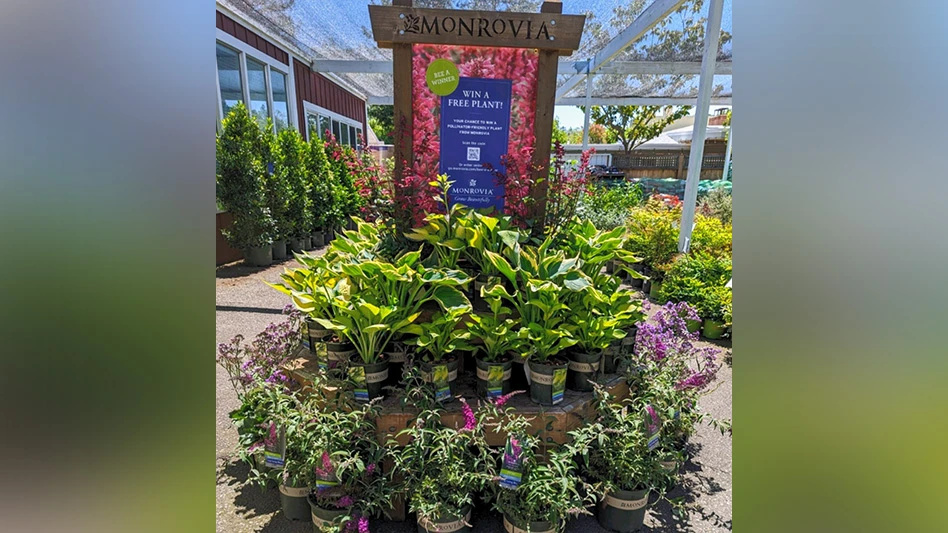Former Garden Center columnist Chad Harris, owner of The Garden Gates in Metairie, La., was one of the keynote speakers at this year’s New England Grows’ Garden Center Success program. Definitely an “outside the box” thinker, Harris has turned his “lifestyle” store, as he likes to call it, into one of the South’s premier shopping destinations. One reason is his knack for creating trends for his customers. This month, he shares some strategies you can use, too.
 The Garden Gates pictured orchids in elegant containers and settings in each of the marketing pieces it used to spur demand—all the while increasing their value in the mind of the consumer. The Garden Gates pictured orchids in elegant containers and settings in each of the marketing pieces it used to spur demand—all the while increasing their value in the mind of the consumer. |
Garden Center: We’ve heard people say that something is as easy as “A-B-C,” but you’ve turned selling into something as easy as “T-V-M.” Please elaborate on what that means.
Chad Harris: Pinpointing your biggest sellers seems to be an important task. But the real question you need to ask is this: What product or service do I sell that requires the least amount of Time, while creating the most Value for the customer and returning the most Money to the business?
Finding the best TVM (time, value, money) products or services starts with research. You can use your POS systems, estimating software or spreadsheets, to collect data that will help determine the following:
- The top 10 selling products
- The top 10 most profitable products
- Space required to sell each product (square footage)
- Inventory turns per product (number of times you deplete inventory on hand in a year)
The data collected will help you determine what products are selling—and selling in a cost-effective manner. I realize this is elementary, but this exercise should be performed over and over to make sure you are focused on results and not using DBM (dart-board mentality). DBM is hoping you hit the bulls-eye every time you throw that dart. It’s easier to consistently nail the bulls-eye with research.
GC: Can you give us an example of something that you did the research on and then “made a killing” with at The Garden Gates?
CH: At our garden center, marketing is very important. We use direct mail as the primary method to drive customers to the store. We follow up with Facebook postings and e-mail marketing to local customers only. Once our research showed us we had a potential to sell orchids, we applied the TVM Principle to find the best way to sell orchids.
In each of our marketing efforts, we featured the plants potted in stylish containers—they looked great, but the real message we delivered in every marketing piece was that we consistently provide the same quality, the same product and the same price.
Originally, we offered orchids in 2-inch, 4-inch and 6-inch containers in a variety of colors. Our research showed that we sold about 30 a month (360 a year) from 3 square-feet of the store. On accident, we found a new grower that sold beautiful 4-inch double spiked white orchids, so we worked those into the mix.
Taking all this information and applying the TVM principle, we decided to try to grow demand by limiting our inventory to only orchids in white, including the new spiked versions. When no customers complained, we then cut back the selection to 2-inch and 4-inch only. As we narrowed the choices available, the question became, “How many to buy?,” and suddenly we were able to provide a product of outstanding quality, great value and 60- to 65-percent margins. It was a win for everyone—now we sell 1,500 orchids a year.
GC: We hear you do pretty well with Christmas tree sales, as well. Do you have a secret formula for success in that realm?
CH: Many home and garden stores sell Christmas trees; if you don’t you are missing an incredible opportunity. It’s a great business, with fast turn-around, and it helps fill those pockets for the long winter ahead.
Consumers are conventionally inclined to think about buying a Christmas tree the day after Thanksgiving or the first weekend in December. Why? Because that’s when we’ve always told them they should be conventionally inclined to think about buying a Christmas tree.
We start selling Christmas trees in September—and we sell a bunch of them. Selling more trees is as simple as reprogramming our customers.
Here at The Garden Gates in the New Orleans area, we use an easy, five-step process to increase Christmas tree sales and attract new customers to the business all at the same time.
Step 1. Track every Christmas tree sale you made last year and capture the name and address of the folks who made the purchases. If you can capture the e-mail address, that’s even better.
Step 2. Create a direct-mail piece, a large postcard, and mail it to every customer that bought a tree the previous year. In it you tell them to buy early—because you’re gonna run out! Send this piece out on Sept. 10.
Step 3. Send a weekly e-mail blast for a month to each customer to whom you sent the postcard. The e-mails should focus on what’s going on at your garden center (“New Flowers Have Arrived!,” etc.), and at the bottom be sure to devote a section to remind them “How the Early-bird Customer Gets the Best Christmas Trees.”
Step 4. Buy a mailing list of approximately 10,000 names. Mail a postcard to each of these prospective customers telling them to buy your trees because they are the best. Make sure to add your existing customer list, as well, to help remind the established customers that haven’t bought trees yet just what they’re missing.
Step 5. Don’t sell your products with a discount or coupon. Make the value your service. Make your service so unbelievably good that there is no reason to discount it.
While you execute this customer service gesture, be sure to retrain the thinking that goes on at the store. Teach your staff to talk about Christmas trees with everyone and to promote the marketing campaign. It can be a simple message during a conversation about how people are already buying trees. Your customers will be great messengers; they will tell everyone.
They also received that postcard and may not have reacted to the message, but you can bet they are talking about it with their friends, business colleagues and neighbors. They might be saying you’re nuts, but they will be talking about what you’re doing. The next thing you know, you’re moving Christmas trees in September.

Explore the April 2012 Issue
Check out more from this issue and find your next story to read.
Latest from Garden Center
- This Florida garden center's busiest days are in the fall, not spring. Find out how they do it
- Terra Nova Nurseries releases new agastache variety, 'Peach Pearl'
- The Certified Shopify Online Garden Center provides local retailers with ecommerce tool
- Meet the All-America Selections AAS winners for 2025
- Endless Summer hydrangeas and Suntory Senetti glam up Grammys red carpet
- Ball Seed releases 2025 edition of 'Thrive and Flourish' for landscape and garden retail
- American Floral Endowment's Fred C. Gloeckner Foundation Research Fund accepting grant proposals
- Floral Marketing Fund and CalFlowers partner to advance floral industry





